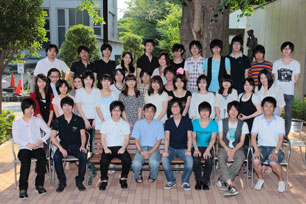Yoshihisa Hagiwara, Professor, Faculty of Law, Department of Political Science
Talking politics is not welcome at a “symposion (feast)”.
This is a seminar class on political philosophy, political theory and peace studies. There are presently 7 graduate and 33 undergraduate students enrolled in the class. To avoid being bogged down with abstract theories, we go to Okinawa every year for our summer seminar, where we are able to see and feel the scars from the Battle of Okinawa and think about the problems associated with the U.S. military bases.

With blatant disregard of the official timetable, our weekly seminar debates often go on for hours. Participants are students, graduate students and myself, but also philosophers of different periods and regions, even those from the land of the dead are invited… this is the style of our seminar class.
Needless to say, this is a figure of speech. We are certainly not some dubious psychical research group engaged in extrasensory experience. What I want to say is that, when conducting a debate in my seminar class, no one, not me (a teacher), and not even the intellectual giants who have left indelible marks on history, can occupy a privileged position with regard to the interpretation of texts, including self-authored ones. Our discussions always aim for a “fusion of horizons” among participants with different values and viewpoints, and even great philosophers who serve to set the agenda are seen to be simple participants on an equal footing.
In other words, what we are looking for is not the “correct interpretation” (if there is ever such a thing) of a text, but (to put it somewhat provocatively) the creative misinterpretation. For that, we may have to be more Hobbesian than the actual Hobbes, and in some cases, read the text of Arendt against her intentions.
So it is a taboo in our seminar class to say, “I fully understand”. If you come to a complete understanding, there would no longer be any room for questioning. While making efforts to understand something, we continue with our struggles to understand what remains to be understood.
My role in the seminar of this discursive nature is to serve as a guide so that students will come to realize the joy of “learning”. Once the students experience this joy, and begin by themselves the search for knowledge, my role as a teacher is over. In that sense, it is my job to figure out a way to reduce my work, a way to let students become self-directing quickly so that it will make my life easier.
Student's Voice
Akie Shibutani, Fourth-year Student,
Faculty of Law
To be a responsible speaker
“Politics is to express an opinion in a public sphere”. These words of Prof. Hagiwara have left a strong impression on me. However, this is easier said than done, and in fact it takes a lot of courage to express one’s opinion in public. This is because an “opinion” can never be absolutely correct, and can only be an imperfect thing, limited to what one has seen, heard and experienced in the past. Even so, we have to continue to express such “opinions” with no guarantee that they are correct, and at the same time, the public “speech” (because it is public) has the power to change reality both in good and bad ways. What I really learned in this seminar class is the attitude of trying to be a responsible speaker in such a public sphere, while taking all kinds of criticism.
*Position titles, etc., are those at the time of publishing.
